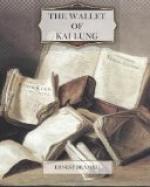side of the water, he engaged the attention of the
first tiger which came to drink, and discharged arrow
after arrow into its body with unfailing power and
precision. So entrancing, indeed, had the pursuit
become that the next seven days lengthened out into
the apparent period of as many moons, in such a leisurely
manner did they rise and fall. On the appointed
day, without waiting for the evening to arrive, the
youth set out with the first appearance of light,
and penetrated into the most inaccessible jungles,
crying aloud words of taunt-laden challenge to all
the beasts therein, and accusing the ancestors of their
race of every imaginable variety of evil behaviour.
Yet so great had become the renown of the one who
stood forth, and so widely had the warning voice been
passed from tree to tree, preparing all who dwelt in
the forest against his anger, that not even the fiercest
replied openly, though low growls and mutterings proceeded
from every cave within a bow-shot’s distance
around. Wearying quickly of such feeble and timorous
demonstrations, the youth rushed into the cave from
which the loudest murmurs proceeded, and there discovered
a tiger of unnatural size, surrounded by the bones
of innumerable ones whom it had devoured; for from
time to time its ravages became so great and unbearable,
that armies were raised in the neighbouring villages
and sent to destroy it, but more than a few stragglers
never returned. Plainly recognizing that a just
and inevitable vengeance had overtaken it, the tiger
made only a very inferior exhibition of resistance,
and the youth, having first stunned it with a blow
of his closed hand, seized it by the middle, and repeatedly
dashed its head against the rocky sides of its retreat.
He then performed for the third time the ceremony
enjoined by the Mandarin, and having cast upon the
cringing and despicable forms concealed in the surrounding
woods and caves a look of dignified and ineffable
contempt, set out upon his homeward journey, and in
the space of three days’ time reached the town
of the versatile Poo-chow. “Behold,”
exclaimed that person, when, lifting up his eyes,
he saw the youth approaching laden with the skins of
the tigers and other spoils, “now at least the
youths and maidens of your native village will no
longer withdraw themselves from the company of so
undoubtedly heroic a person.” “Illustrious
Mandarin,” replied the other, casting both his
weapons and his trophies before his inspired adviser’s
feet, “what has this person to do with the little
ones of either sex? Give him rather the foremost
place in your ever-victorious company of bowmen, so
that he may repay in part the undoubted debt under
which he henceforth exists.” This proposal
found favour with the pure-minded Poo-chow, so that
in course of time the unassuming youth who had come
supplicating his advice became the valiant commander
of his army, and the one eventually chosen to present
plighting gifts to his only daughter.’
“When the father had completed the narrative of how the faint-hearted youth became in the end a courageous and resourceful leader of bowmen, Sen looked up, and not in any degree understanding the purpose of the story, or why it had been set forth before him, exclaimed:




